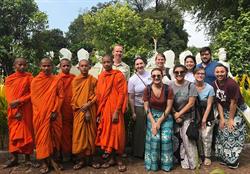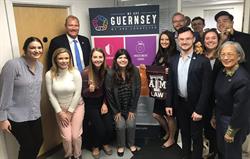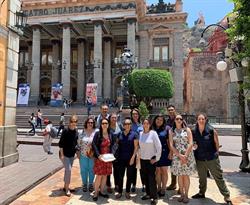Texas A&M University School of Law provides opportunities for students to study across the globe. Aggie Law students will go outside the classroom, outside the United States and across the globe to explore many aspects of law and practicing law.
Professor Charlotte Ku, law school director of global programs, is joined by Professors Mark Burge, Irene Calboli, Jeff Slattery, Luz Herrera, Huyen Pham, Angela Morrison, Guillermo Garcia, Joan Mileski (TAMU Galveston), Cassia Bomer Galvao (TAMU Galveston), JoAnn DiGeorgio-Lutz (TAMU Galveston) and Dean Andrew Morriss (TAMU School of Innovation).
Global Lawyering
Students explore topics drawing on expert and practice-based resources available only on-site. The start of the course is at the law school researching and preparing for the field study during the Spring semester. The field study trip takes place in May. Upon return, students reflect on skills and substantive legal and policy knowledge gained during the trip through a debrief, reflection exercises and a research project completed in the Fall.
The start of the course is at the law school researching and preparing for the field study during the Spring semester. The field study trip takes place in May. Upon return, students reflect on skills and substantive legal and policy knowledge gained during the trip through a debrief, reflection exercises and a research project completed in the Fall.
Spring/Summer 2020 Opportunities include:
Financial Regulation and Brexit: The Channel Islands – Jersey and Guernsey
(Field Course: May 9-24, 2020)
Professor Mark Burge and School of Innovation Dean Andrew Morriss
For historic reasons, the Channel Islands of Jersey, Guernsey, Sark, and Alderney (located in the English Channel between the United Kingdom and France) are associated with the United

Kingdom, but are not part of it. Building on this status, these islands have become international financial centers serving as gateways to Europe and the UK for non-European Union and non-UK businesses and investors. Through meetings with government officials, practitioners, representatives from the financial industry, and regulators, students will focus on the Channel Islands as a case study of how small jurisdictions can become important players in international policy, regulation, and law enforcement.
Art, Food, Fashion, Culture: Trade, e-Commerce and Sustainable Development – Cambodia
(Field Course: May 15-31, 2020)
Professors Irene Calboli and Jeff Slattery
This course provides an opportunity to learn about international and domestic legal issues related to trade and sustainable development in the fast-growing nation of Cambodia. Students will explore the progress of law, business, and economic interests from ancient to modern times, meeting with government ministers, local attorneys, community leaders, and other stakeholders to discuss their concerns about and ideas for the future.
Reintegration Project – Mexico
(Field Course: May 2-16, 2020)
Professors Luz Herrera, Huyen Pham, Angela Morrison, and Guillermo Garcia

The Mexican Reintegration Project will travel to Mexico City and Guanajuato, Mexico from May 2-16. While there, the group will visit with government officials, civil society groups, and Mexicans returnees and deportees to learn about their experiences and needs. Students on the trip will help interview individuals to help create a narrative of the experience to understand the reasons for migration and the experience of reintegrating into Mexican society. Students will work with Mexican students and nonprofit leaders to conduct know your legal rights information sessions and create informational brochures to assist Mexican returnees and their U.S.-born family members to better understand their legal rights and responsibilities in the U.S. and Mexico.
International Maritime Industry, Global Governance, and World Trade: London, UK; Geneva, Switzerland; Valetta, Malta
(Field Course: May 9-23, 2020)
Professor Charlotte Ku and TAMU Galveston Professors Joan Mileski, Cassia Bomer Galvao and JoAnnDiGeorgio-Lutz
Organized in cooperation with the Maritime Administration and Liberal Arts Programs of Texas A&M University Galveston, this course will examine the regulatory and business environment governing trade by sea. Virtually everything that we use – consumer goods, fuel, and food is transported by sea. Yet, shipping today is an invisible industry that operates in a complex multijurisdictional business and regulatory environment. The course will provide students direct contact with industry managers and regulators in the international maritime industry. Law students will join Maritime Administration students to learn the fundamentals of the maritime industry and of world trade and the international law and regulations that govern these areas. The course will travel to the Port of Houston, International Maritime Organization based in London, the World Trade Organization and the United Nations Conference on Trade and Development based in Geneva, and the International Maritime Law Institute based in Valetta, Malta.
To read more about the 2019 experiences, click
here.
 The start of the course is at the law school researching and preparing for the field study during the Spring semester. The field study trip takes place in May. Upon return, students reflect on skills and substantive legal and policy knowledge gained during the trip through a debrief, reflection exercises and a research project completed in the Fall.
The start of the course is at the law school researching and preparing for the field study during the Spring semester. The field study trip takes place in May. Upon return, students reflect on skills and substantive legal and policy knowledge gained during the trip through a debrief, reflection exercises and a research project completed in the Fall. Kingdom, but are not part of it. Building on this status, these islands have become international financial centers serving as gateways to Europe and the UK for non-European Union and non-UK businesses and investors. Through meetings with government officials, practitioners, representatives from the financial industry, and regulators, students will focus on the Channel Islands as a case study of how small jurisdictions can become important players in international policy, regulation, and law enforcement.
Kingdom, but are not part of it. Building on this status, these islands have become international financial centers serving as gateways to Europe and the UK for non-European Union and non-UK businesses and investors. Through meetings with government officials, practitioners, representatives from the financial industry, and regulators, students will focus on the Channel Islands as a case study of how small jurisdictions can become important players in international policy, regulation, and law enforcement.